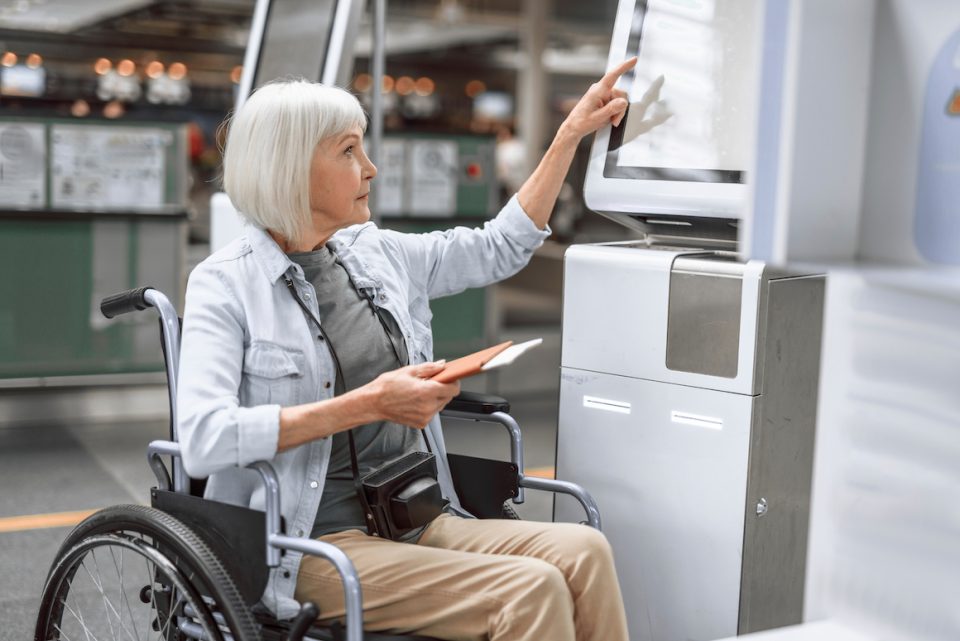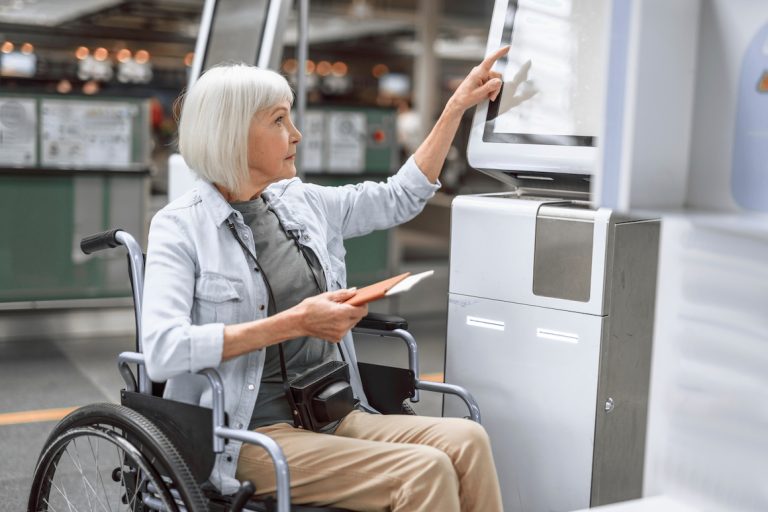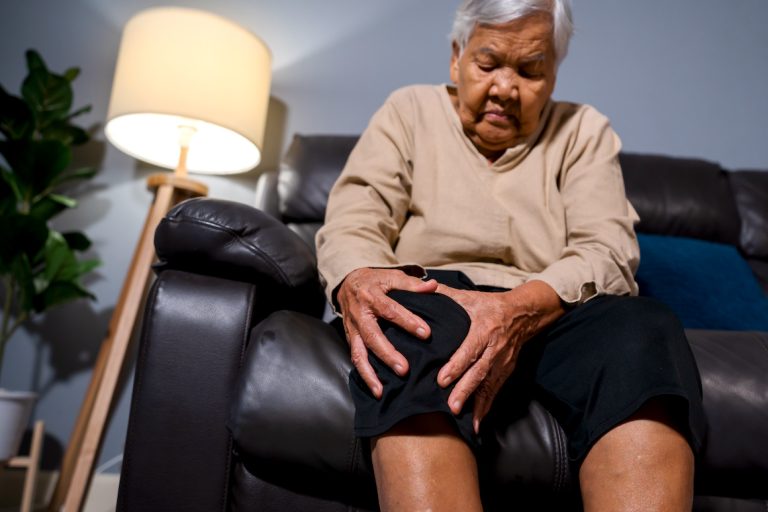Mark Raymond, Jr., was settled in his airline seat, ready for takeoff, when he looked out the window and saw the unthinkable. “We watched my wheelchair fall off the conveyer belt,” he recalls.
Since that experience, Raymond, who lost the ability to walk after a shallow diving accident in 2016, has learned to advocate for himself, including educating airline and other transportation people on how to push the chair, get him out of his wheelchair onto the small aisle chair used to transport him to his seat, and how to transport his chair safely to his destination.
“I’m not relying on their training,” he says, although he has learned that communicating his needs with patience usually pays off. He’s also the CEO and founder of the Split Second Foundation, a New Orleans-based resource and advocacy group for families impacted by disability.
In 2022, the National Household Travel Survey reported that of the 18.6 million Americans, ages 5 and older with self-reported disabilities that limited travel — almost half (41% or 7.7 million) were ages 65 and above.
For them, resources like Raymond’s Split Second Foundation, a host of government resources and tips from Raymond and others in the know, are making it easier to hit the road or skies and enjoy the time away.
Travel Resources and Info
Among the resources, programs and protections to know about:
Air Carrier Access Act (ACAA): This law makes it illegal for airlines to discriminate against any passenger because of their disability. The protection applies to all flights to, from or within the United States. The Department of Transportation enforces it. This page has details what is required in terms of accessible bathrooms, movable aisle armrests, space for storing folding wheelchairs in the cabin, and other information. This page provides information for resolving problems, including hotline numbers and hours of operation.
Train Travel: Likewise, trains make accommodations for those with special mobility needs. A wheelchair traveler, John Morris, a triple amputee after a car accident, lists multiple tips and suggestions here. He covers not only trains, but airlines, buses and subways.
Traveling with Oxygen: The American Lung Association has educational and practical tips for traveling with oxygen, whether by air, bus, train or car. Good to know: You can use an FAA-approved portable oxygen concentrator aloft, and some airlines offer in-flight oxygen for a fee. However, using compressed gas or liquid oxygen on the plane is not allowed. Make arrangements ahead for air travel; you may need paperwork from your doctor or you may need to fill out the airline’s medical information.
Most buses and trains allow personal oxygen devices on board. When traveling by car, secure the oxygen unit on the floor or the seat beside you. On the seat, secure it with a seat belt.
Plan ahead for cruise travel, too, telling them you will be traveling with oxygen. To find cruises especially for travelers on oxygen, google “cruises for people on oxygen.”
More travel tips
Raymond, who is also an accessibility consultant, and Emily Nabors, a spokesperson for the National Council on Aging (NCOA), an advocacy group for older adults, had a variety of other tips on how those with mobility issues can have smoother travels.
- Check ahead of time to see if the ride share companies at your destination have wheelchair accessible vehicles, Raymond says, especially if you’re traveling to a smaller city.
- Check hotels to see if not only rooms are accessible, but public areas.
- Plan everything well in advance, Raymond adds. It’s common advice, but especially holds if you need accommodations to help mobility.
- Check out the program, TSA (Transportation Security Administration) Cares, Nabors says. It offers a variety of services, such as expedited airport screening if needed for travelers age 75 and beyond.
- The NCOA list a host of other travel tips
- Travelers who are deaf, hard of hearing or deaf-blind can check out the requirements of the Air Carrier Access Act that apply to them.
YOUR TURN
What’s your best travel tip to overcome mobility issues?

Kathleen Doheny is a Los Angeles-based independent journalist, specializing in health, behavior, fitness and lifestyle stories. Besides writing for Senior Planet, she reports for WebMD, Medscape, MedCentral and other sites. She is a mom, mother-in-law and proud and happy Mimi who likes to hike, jog and shop.
This article offered by Senior Planet and Older Adults Technology Services is for informational purposes only and is not intended to substitute for professional medical advice, diagnosis, or treatment. Always seek the advice of your physician or other qualified health provider with any questions you may have regarding any medical condition. If you think you may have a medical emergency call 911 immediately.





COMMENTS
Sign Up for Newsletters
There’s always a lot going on in the Senior Planet universe. Get our newsletters to make sure you never miss a thing!
Sign Up Now
Join Senior Planet Community
Senior Planet Community is our social media platform designed specifically for older adult users. Engage in thought-provoking discussions, make new friends, and share resources all on a safe and ad-free platform.
Join the Conversation Today
Upcoming Online Classes
Calendar of Events
S Sun
M Mon
T Tue
W Wed
T Thu
F Fri
S Sat
0 events,
0 events,
15 events,
Stronger Bones
Stronger Bones
Activate the joints and muscles and increase mental focus during this exercise class.
Morning Stretch
Morning Stretch
Start your day with a short morning stretch!
Protecting Your Personal Info Online
Protecting Your Personal Info Online
Registration required.
Learn how to stay safe while you surf the web!
Introduction to Hosting on Zoom
Introduction to Hosting on Zoom
In this introductory lecture, we'll go over what you need to start your first meeting, as well as some hosting tips to make it a success.
Chair Yoga
Chair Yoga
Follow various cues to develop body alignment and breath awareness.
14 events,
4
Morning Stretch
Morning Stretch
Start your day with a short morning stretch!
Virtual Tour: Palma de Mallorca, Spain
Virtual Tour: Palma de Mallorca, Spain
Join Senior Planet and our tour guides from Discover Live for a virtual visit to Spain!
Fit Fusion Workout
Fit Fusion Workout
Get your heart pumping during this fun, high-energy workout!
Google 地圖
Google 地圖
來學習 Google 地圖如何融入您的日常生活。
Cloud Storage
Cloud Storage
Registration required.
Learn the basics of cloud storage — a technology that lets you store documents, images, and other media files remotely.
14 events,
5
Balance/Strength
Balance/Strength
Activate the joints and muscles to become limber and increase balance during this exercise class.
Morning Stretch
Morning Stretch
Start your day with a short morning stretch!
Introduction to Social Media
Introduction to Social Media
Learn about some of the more popular social media sites like Facebook, Twitter, Instagram, TikTok and LinkedIn.
Introduction to Estate Planning Resources & Tools
Introduction to Estate Planning Resources & Tools
Registration required.
A simple plan is better than no plan! Get to know a few free and low-cost resources that make it simple to plan your estate.
Tips for Being News Savvy Online
Tips for Being News Savvy Online
Registration required.
Sharing the news? Learn to read and check sources before sharing!
10 events,
6
Morning Stretch
Morning Stretch
Start your day with a short morning stretch!
Introducción a X, (anteriormente Twitter)
Introducción a X, (anteriormente Twitter)
¿Ha escuchado de X? Le damos la bienvenida a esta sesión de resumen sobre la plataforma X.
Understanding Internet Plans
Understanding Internet Plans
Faster is not always better! Come learn about home internet options so you only pay for what you need.
Taijiquan (Tai Chi)
Taijiquan (Tai Chi)
Relax your mind and strengthen your body with this gentle exercise class.
Internet of Things: Healthcare
Internet of Things: Healthcare
Registration required.
Come learn how the medical industry is embracing the Internet of Things (IoT) technology to treat patients remotely.
3 events,
7
Job Searching in the Digital Age
Job Searching in the Digital Age
This lecture will provide an overview of how to use social media in your job search, demonstrate digital job searching tools like LinkedIn, and offer tips and advice to job seekers.
Using Google Docs Templates for Resumes
Using Google Docs Templates for Resumes
Don't worry about formatting your resume. Let the templates do the work for you!
Social Media for Job Searches
Social Media for Job Searches
In this lecture, we’ll discuss ways to make sure social media helps you when you’re looking for work!
0 events,
8
15 events,
9
Good Morning, Senior Planet!
Good Morning, Senior Planet!
Start your week off right with a preview of the week's upcoming programs and a guided meditation session!
Morning Stretch
Morning Stretch
Start your day with a short morning stretch!
Introduction to Heart Rate Monitor Apps
Introduction to Heart Rate Monitor Apps
Registration required.
Did you know your phone can measure your heart rate? Learn about free heart rate monitor apps and why they can be useful.
Functional Strength Training
Functional Strength Training
Use bodyweight, bands, and dumbbells to build your strength.
Fit Fusion Workout
Fit Fusion Workout
Get your heart pumping during this fun, high-energy workout!
16 events,
10
Stronger Bones
Stronger Bones
Activate the joints and muscles and increase mental focus during this exercise class.
Morning Stretch
Morning Stretch
Start your day with a short morning stretch!
Digital Coupon Tools
Digital Coupon Tools
Learn how digital coupon tools can help you save money!
Meal Kit Services
Meal Kit Services
Don't want to cook? Learn about meal kit services that take the stress out of meal time!
AI & Disinformation
AI & Disinformation
Seeing might not mean believing anymore. Come learn how to identify deepfakes and cloned voices so you don't fall for digital deception.
13 events,
11
Morning Stretch
Morning Stretch
Start your day with a short morning stretch!
Intro to Translation Tools
Intro to Translation Tools
This lecture will introduce digital translation tools and apps, such as Google Translate.
Fit Fusion Workout
Fit Fusion Workout
Get your heart pumping during this fun, high-energy workout!
雲端儲存空間
雲端儲存空間
來聆聽為什麼您會想要開始使用雲端儲存空間。
Telemedicine
Telemedicine
Registration required.
This lecture provides an overview of telemedicine options and focuses on exploring virtual medical appointments with your doctor in real-time.
13 events,
12
Balance/Strength
Balance/Strength
Activate the joints and muscles to become limber and increase balance during this exercise class.
Morning Stretch
Morning Stretch
Start your day with a short morning stretch!
iPhones
iPhones
Curious about iPhones? Come to this lecture for an overview of their features.
Graphic Design Tools
Graphic Design Tools
In this presentation, we'll explore the popular design platform, Canva, and demonstrate how you can get very creative with basic tools like Google Slides.
Chair Yoga
Chair Yoga
Follow various cues to develop body alignment and breath awareness.
10 events,
13
Morning Stretch
Morning Stretch
Start your day with a short morning stretch!
Internet de las cosas: estilo de vida y entretenimiento
Internet de las cosas: estilo de vida y entretenimiento
¡Descubra cómo el Internet de las cosas está cambiando la industria del entretenimiento!
Virtual Museum Tours
Virtual Museum Tours
In this lecture we'll explore some of these virtual galleries, as well as digital tools that help bring art, architecture, and history to life!
Taijiquan (Tai Chi)
Taijiquan (Tai Chi)
Relax your mind and strengthen your body with this gentle exercise class.
Smartphone Camera Uses Beyond Photography
Smartphone Camera Uses Beyond Photography
Come learn about QR codes, augmented reality apps, and more!
3 events,
14
Cloud Storage
Cloud Storage
Learn the basics of cloud storage — a technology that lets you store documents, images, and other media files remotely.
Google Workspace
Google Workspace
Learn about some of Google's most popular productivity tools that are for personal use, as well as work-related ones.
Internet of Things at a Glance
Internet of Things at a Glance
This lecture provides an overview of the vast world of the Internet of Things and discusses best practices for keeping your devices secure.
0 events,
15
15 events,
16
Good Morning, Senior Planet!
Good Morning, Senior Planet!
Start your week off right with a preview of the week's upcoming programs and a guided meditation session!
Morning Stretch
Morning Stretch
Start your day with a short morning stretch!
Mobile Health Apps
Mobile Health Apps
Registration required.
This lecture introduces common health apps, like the iPhone's built-in app and the Google Fit app.
Functional Strength Training
Functional Strength Training
Use bodyweight, bands, and dumbbells to build your strength.
Fit Fusion Workout
Fit Fusion Workout
Get your heart pumping during this fun, high-energy workout!
15 events,
17
Stronger Bones
Stronger Bones
Activate the joints and muscles and increase mental focus during this exercise class.
Morning Stretch
Morning Stretch
Start your day with a short morning stretch!
Online Shopping
Online Shopping
This lecture will provide a general introduction to shopping online using the popular website Amazon.com.
Anti-Virus & Malware Removal Programs At a Glance
Anti-Virus & Malware Removal Programs At a Glance
Registration required.
Concerned about viruses and malware? Attend this lecture to learn how to keep your device safe!
AI Image Generators
AI Image Generators
Go beyond stick figures and bring your imagination to life with AI image generators!
13 events,
18
Morning Stretch
Morning Stretch
Start your day with a short morning stretch!
Spotify
Spotify
In this lecture, you'll learn about Spotify’s important features, including how to search for songs and create your own playlists.
物聯網:智慧城市
物聯網:智慧城市
快來了解物聯網 (IoT) 技術如何被整合到全球城市的最基本功能中。
Fit Fusion Workout
Fit Fusion Workout
Get your heart pumping during this fun, high-energy workout!
Internet of Things: Wearables
Internet of Things: Wearables
Registration required.
Learn about the health, wellness, and personal safety benefits of wearable technology.
13 events,
19
Balance/Strength
Balance/Strength
Activate the joints and muscles to become limber and increase balance during this exercise class.
Morning Stretch
Morning Stretch
Start your day with a short morning stretch!
Facebook
Facebook
Facebook can be a great way to connect with old friends, share life updates, and join social groups. Learn more about the popular platform.
Affordable Home Internet
Affordable Home Internet
Don't overpay for internet. Learn about programs offering low-cost home internet that can help save you money.
Chair Yoga
Chair Yoga
Follow various cues to develop body alignment and breath awareness.
9 events,
20
Morning Stretch
Morning Stretch
Start your day with a short morning stretch!
YouTube
YouTube
This presentation will give an overview of the free content available on YouTube and show you how to navigate the site with ease.
Compras en línea
Compras en línea
¿Ha comprado algo en Amazon? ¿Quiere saber si el producto que ve en la tienda es más barato en línea? ¡Venga a aprender más sobre compras en línea!
Taijiquan (Tai Chi)
Taijiquan (Tai Chi)
Relax your mind and strengthen your body with this gentle exercise class.
Reddit at a Glance
Reddit at a Glance
Stumped? Find what you're looking for on Reddit!
3 events,
21
Digital Legacy at a Glance
Digital Legacy at a Glance
Will your digital content and social media pages live on forever? Come learn about your digital legacy options!
Introduction to Estate Planning Resources & Tools
Introduction to Estate Planning Resources & Tools
A simple plan is better than no plan! Get to know a few free and low-cost resources that make it simple to plan your estate.
Digital Scrapbooking Tools
Digital Scrapbooking Tools
Say goodbye to paper cuts! Come learn about digital scrapbooking tools.
0 events,
22
15 events,
23
Good Morning, Senior Planet!
Good Morning, Senior Planet!
Start your week off right with a preview of the week's upcoming programs and a guided meditation session!
Morning Stretch
Morning Stretch
Start your day with a short morning stretch!
Functional Strength Training
Functional Strength Training
Use bodyweight, bands, and dumbbells to build your strength.
Intro to Managing Your Privacy
Intro to Managing Your Privacy
Registration required.
Concerned about privacy? Unsure about accepting cookies? Come learn about some essential privacy tips!
Fit Fusion Workout
Fit Fusion Workout
Get your heart pumping during this fun, high-energy workout!
15 events,
24
Stronger Bones
Stronger Bones
Activate the joints and muscles and increase mental focus during this exercise class.
Morning Stretch
Morning Stretch
Start your day with a short morning stretch!
Introduction to Booking Vacation Stays Online
Introduction to Booking Vacation Stays Online
Need a vacation? Learn about popular websites and apps for booking vacation rentals.
Gardening Tech At a Glance
Gardening Tech At a Glance
Can tech give you a green thumb? Come to this lecture to find out!
Chair Yoga
Chair Yoga
Follow various cues to develop body alignment and breath awareness.
11 events,
25
Morning Stretch
Morning Stretch
Start your day with a short morning stretch!
物聯網 : 生活方式和娛樂
物聯網 : 生活方式和娛樂
本講座將探討我們日常與物聯網交互的多種方式,並了解它如何徹底改變整個行業。
Fit Fusion Workout
Fit Fusion Workout
Get your heart pumping during this fun, high-energy workout!
Smartphones at a Glance
Smartphones at a Glance
Registration required.
How smart are they? We'll tell you all about smartphones.
Functional Strength Training
Functional Strength Training
Use bodyweight, bands, and dumbbells to build your strength.
14 events,
26
Balance/Strength
Balance/Strength
Activate the joints and muscles to become limber and increase balance during this exercise class.
Morning Stretch
Morning Stretch
Start your day with a short morning stretch!
Intro to Gaming
Intro to Gaming
Game on! Come discover the world of gaming and start playing!
Google Maps
Google Maps
Registration required.
During this lecture, you’ll get an introduction to Google Maps and a demonstration of how to use it.
Introduction to Nextdoor
Introduction to Nextdoor
This presentation will introduce you to the most common uses for the Nextdoor app and its main features, along with some best practices for using it safely.
11 events,
27
Morning Stretch
Morning Stretch
Start your day with a short morning stretch!
Intro to X (formerly Twitter)
Intro to X (formerly Twitter)
Like to know what's happening? Come learn about X (formerly Twitter)!
Sitios de viajes en línea
Sitios de viajes en línea
¿A dónde quiere viajar? El internet le puede ayudar a planear su próximo viaje! ¡Aprenda con nosotros!
Taijiquan (Tai Chi)
Taijiquan (Tai Chi)
Relax your mind and strengthen your body with this gentle exercise class.
Meetup
Meetup
This lecture introduces Meetup, a popular online platform for finding social groups and events all over the world.
3 events,
28
iPhones
iPhones
Curious about iPhones? Come to this lecture for an overview of their features.
Messaging Apps
Messaging Apps
This lecture will go over the features of three widely-used apps: iMessages, Google Chats, and WhatsApp.
Emojis, GIFs, and more!
Emojis, GIFs, and more!
Learn how to use emojis, GIFs, and more to quickly say what you mean!
0 events,
29
2 events,
30
Virtual Orientation to Senior Planet
Virtual Orientation to Senior Planet
Come learn about all that Senior Planet has to offer!
Better Balance Boot Camp: Week 4
Better Balance Boot Camp: Week 4
Registration required.
Learn how to lower your risk of falling and improve your balance skills!
0 events,
1
0 events,
2
1 event,
3
Death Cafe
Death Cafe
Join this session to engage in meaningful conversation about death in a safe and open environment.
0 events,
4
0 events,
5
Stronger Bones
Morning Stretch
Protecting Your Personal Info Online
Introduction to Hosting on Zoom
Chair Yoga
Morning Stretch
Virtual Tour: Palma de Mallorca, Spain
Fit Fusion Workout
Google 地圖
Cloud Storage
Balance/Strength
Morning Stretch
Introduction to Social Media
Introduction to Estate Planning Resources & Tools
Tips for Being News Savvy Online
Morning Stretch
Introducción a X, (anteriormente Twitter)
Understanding Internet Plans
Taijiquan (Tai Chi)
Internet of Things: Healthcare
Job Searching in the Digital Age
Using Google Docs Templates for Resumes
Social Media for Job Searches
Good Morning, Senior Planet!
Morning Stretch
Introduction to Heart Rate Monitor Apps
Functional Strength Training
Fit Fusion Workout
Stronger Bones
Morning Stretch
Digital Coupon Tools
Meal Kit Services
AI & Disinformation
Morning Stretch
Intro to Translation Tools
Fit Fusion Workout
雲端儲存空間
Telemedicine
Balance/Strength
Morning Stretch
iPhones
Graphic Design Tools
Chair Yoga
Morning Stretch
Internet de las cosas: estilo de vida y entretenimiento
Virtual Museum Tours
Taijiquan (Tai Chi)
Smartphone Camera Uses Beyond Photography
Cloud Storage
Google Workspace
Internet of Things at a Glance
Good Morning, Senior Planet!
Morning Stretch
Mobile Health Apps
Functional Strength Training
Fit Fusion Workout
Stronger Bones
Morning Stretch
Online Shopping
Anti-Virus & Malware Removal Programs At a Glance
AI Image Generators
Morning Stretch
Spotify
物聯網:智慧城市
Fit Fusion Workout
Internet of Things: Wearables
Balance/Strength
Morning Stretch
Facebook
Affordable Home Internet
Chair Yoga
Morning Stretch
YouTube
Compras en línea
Taijiquan (Tai Chi)
Reddit at a Glance
Digital Legacy at a Glance
Introduction to Estate Planning Resources & Tools
Digital Scrapbooking Tools
Good Morning, Senior Planet!
Morning Stretch
Functional Strength Training
Intro to Managing Your Privacy
Fit Fusion Workout
Stronger Bones
Morning Stretch
Introduction to Booking Vacation Stays Online
Gardening Tech At a Glance
Chair Yoga
Morning Stretch
物聯網 : 生活方式和娛樂
Fit Fusion Workout
Smartphones at a Glance
Functional Strength Training
Balance/Strength
Morning Stretch
Intro to Gaming
Google Maps
Introduction to Nextdoor
Morning Stretch
Intro to X (formerly Twitter)
Sitios de viajes en línea
Taijiquan (Tai Chi)
Meetup
iPhones
Messaging Apps
Emojis, GIFs, and more!
Virtual Orientation to Senior Planet
Better Balance Boot Camp: Week 4
Death Cafe
Recent Articles
Recent Comments